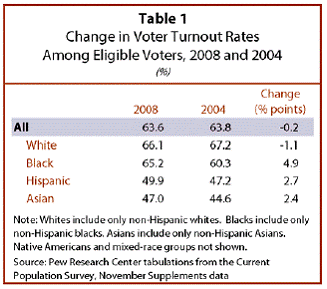By: Inoljt, http://mypolitikal.com/
In the 2008 presidential election, 65.3% of eligible blacks voted – a voting rate about equal to the 66.1% of eligible whites who voted.
This is actually quite amazing. Indeed, in demographic terms this should not be happening.
The reason why below.
Here is why. Voter participation is affected by many categories. Age, for instance, is one factor. Young people, busy with their lives and politically less involved, have historically low voting rates. The elderly, on the other hand, vote in high numbers. Immigrants are also less likely to vote – thus the immigrant-heavy Hispanic and Asian communities have quite low voting rates, as the chart above indicates.
These two specific factors affect blacks and whites about equally. Others, however, hit blacks harder. As a whole, the black electorate is much poorer than the white electorate, and poor people are less likely to vote in the United States. In the 1988 presidential election, voter turn-out amongst the bottom fifth of Americans was 36.4%. Amongst the top fifth of Americans it was 63.1%. Education levels have a positive correlation with turn-out – and education attainment is lower amongst blacks than whites. More blacks also live in the South, where turn-out has been historically lower than the national mean. Finally, there are millions of blacks disenfranchised as ex-felons.
Demographically, therefore, blacks should be voting less than whites – and yet they are not.
This has startling implications. It means that a black person is far more likely to vote than a white person of similar circumstances. Indeed, according to the Census “the odds of voting in 2008 were about twice as high for blacks,” than whites once age, region, sex, income and educational attainment were factored in.
In other words, a black plumber was twice as likely to vote as a white plumber, a black lawyer twice as likely to vote as a white one. It is only because lawyers are more likely to vote than plumbers – and because the ratio of poor plumbers to rich lawyers is higher amongst blacks than whites – that voting participation is equal amongst blacks and whites.
This phenomenon is not just limited to 2008. In 2004 black voters in the South composed 17.9% of the overall Southern electorate, equal to their share of eligible voters. Consider that Southern blacks are poorer, less educated, and more likely to be in jail than Southern whites – yet still vote at the same rates as Southern whites. This means that a 30-year-old black male making $60,000 was much more likely to vote than his white counterpart.
So the next time that a political pundit talks about low black turn-out, don’t believe it. Person to person, man to man, blacks vote more often than any other race.
